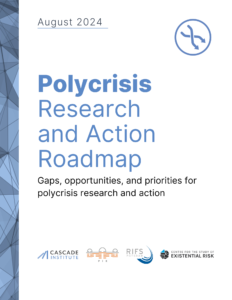Polycrisis Research and Action Plan
Accelerating Polycrisis Research and Action
The Polycrisis Research and Action Roadmap identifies theoretical, empirical, practical, and community-building gaps in the growing field of polycrisis knowledge and action.
This forum is a space for polycrisis community members to share suggestions on these gaps, to publicize projects and events that address these gaps, and to strengthen collaboration on polycrisis projects.
Fill out the form below or inline with specific gap areas below to submit a contribution.
Jump to gap sections:
Theoretical foundations
Those engaged in polycrisis analysis disagree about the conceptualization of crisis versus risk; the plural versus singular nature of polycrisis; the role of power and agency alongside systemic structures in polycrisis analysis; and the nature of crisis interactions sufficient to constitute a polycrisis. While these issues may not be resolvable, theorists should be more explicit about their positions on them to aid knowledge cumulation.
| Gaps and challenges | Solutions |
|---|---|
| Disagreement about the definitions of core concepts (crisis vs. risk, polycrises vs. "the Polycrisis") |
|
| Weak theory on the role of system structure, power, and agency in shaping polycrisis and polycrisis response |
|
| Lack of precision about how crises spread (specifically, the strength and character of polycrisis interactions) |
|
Empirical research
Research has begun to explore past and present polycrises at multiple scales in productive ways, but researchers need to more clearly identify the systems under investigation, the boundaries of those systems, and the particular crises that make up a polycrisis. Key research priorities include identifying the mechanisms of crisis transmission among systems and the lessons of past polycrises, given their commonalities and differences with present and possible future ones. Empirical research should explore and expand the full range of available methods, models, and datasets so as to build a rigorous and inter-disciplinary field of inquiry.
| Gaps and challenges | Solutions |
|---|---|
| System boundaries and "constituent" crises are difficult to define |
|
| Lack of real-world case studies of "crisis transmission mechanisms" |
|
| Lack of clear guidance on method selection |
|
| Uneven data availability and quality |
|
| Lack of clarity on the relevance of historical case studies for analyzing unfolding crisis interactions |
|
Practical applications
The polycrisis community wants to help policymakers and other frontline actors prevent and respond to urgent, intersecting crises, but the field has a "negativity problem," limiting its audience and potential impact. Also, policymakers and other frontline actors are largely excluded from the research process. To address these two challenges, organizations conducting polycrisis research should engage communications experts to learn how to better frame polycrisis analysis and identify policymaking "champions" whose expertise and priorities can be integrated into research projects.
| Gaps and challenges | Solutions |
|---|---|
| Polycrisis research and analysis fixates on negative outcomes, limiting its audience and potential impact. |
|
| Policymakers and "frontline actors" are excluded from the research process. |
|
| Polycrisis analysis tends to be expert-driven and exclusionary. |
|
| Polycrisis researchers are discouraged from producing applied research focusing on codevelopment and real-world impact. |
|
Community building
The development of the polycrisis field requires a cohesive identity for polycrisis researchers, wider inclusion of diverse perspectives, increased public outreach, and expanded organizational infrastructure, such as research positions, communications platforms, annual meetings, and cooperative coordination. The polycrisis community should therefore develop a set of shared principles, initiatives to increase participation from the Global South and other underrepresented groups, means to support members intellectually and financially, and strategies to increase communication and understanding both within the group and beyond.
| Gaps and challenges | Solutions |
|---|---|
| Lack of a well-defined polycrisis community identity |
|
| Underrepresentation of the Global South and lack of diverse perspectives |
|
| Low "polycrisis literacy" outside of the polycrisis community |
|
| Lack of dedicated community infrastructure and leadership |
|
| Gap | Contributor | Initiative Description and URL |
|---|---|---|
| Gap addressed | Organization name | Initiative description |

